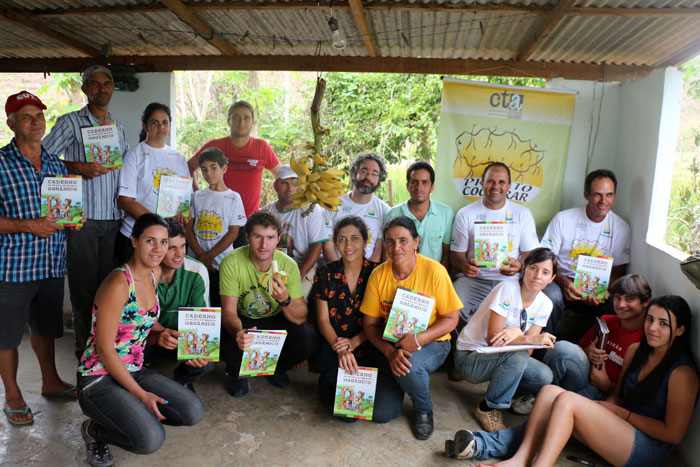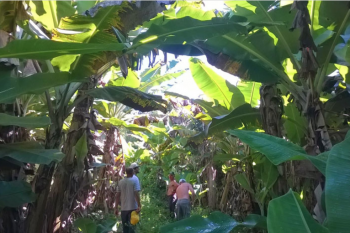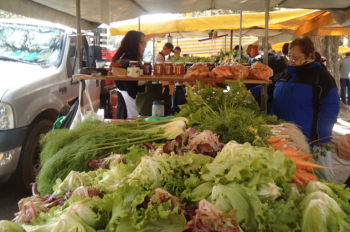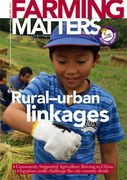Participatory guarantee systems support farmers’ access to markets, and provide an alternative to often prohibitively expensive third-party certification. They also bring together networks of farmers and urban citizens who are redefining food production standards from the bottom up. In the past two years, the number of participatory guarantee systems across Brazil has more than doubled, resulting in better access to healthy food in the cities and more recognition for agroecological farmers.

Although Brazil is well known for its massive investment in industrial agriculture, it is also one of the world references when it comes to public policies supporting agroecology and organic production. This reputation is largely based on a set of policies and institutional programmes that have been implemented since 2000. These include the National Policy for Agroecology and Organic Production launched in 2012, followed by a National Plan in 2013. Consolidating agroecology and supporting organic production are two distinct goals, but participatory guarantee systems (PGS) are an example of an overlapping strategy.
Organic certification and labelling
Participatory guarantee systems
“Participatory guarantee systems are locally focused quality assurance systems. They certify producers based on active participation of stakeholders and are built on a foundation of trust, social networks and knowledge exchange,” states IFOAM, the International Federation of Organic Agriculture Movements. They also provide a reliable guarantee for consumers seeking certified products.
A key difference from third-party certification is that the guarantee is the result of direct participation by producers, consumers and others, who define the standards and verification procedures themselves. The benefits are clear. PGS operate at a local level and are accessible to small scale farmers as costs and bureaucracy are minimised. They support farmers’ flexibility and diversity. They encourage active participation and increase awareness amongst consumers, and they promote expansion of local food production systems.
Participatory guarantee systems are now used by more than half of Brazil’s certified organic producers and their products are increasingly reaching people in the cities. The others are certified via third-party systems. PGS became legally recognised in 2009, supporting two different approaches. The first, based on ‘participatory assessment bodies’, allows farmers to use the same national organic label as that used for third-party certification. The second, based on ‘social control organisations’, only provides certification and not the right to use the organic label. This latter system suits farmers who sell directly to both rural and urban consumers, for example at farmers’ markets or directly from their farms; situations that do not require an organic label.
Today, there are more than 200 such systems across Brazil, meaning much more ecological production reaches consumers, especially in urban areas. And, through PGS, farmers claim their identity as agroecological producers for which they receive greater recognition and support.
Autonomy
PGS also increase the autonomy of agroecological producers. “The middleman buying our products would mix everything, with or without pesticides, and decide how much he would pay,” lamented Terêncio, a farmer from the community of Arroio do Padre on the north coast of Rio Grande do Sul in southern Brazil. He is amongst a group of farmers producing in an agroecological way and struggling for more autonomy. Besides relying on middlemen to reach markets because of long distances, they were increasingly confronted by demands of middlemen to specialise and produce greater quantities of single products. This was not always in line with their aspirations.
In 2006, this group of family farmers formed the Cooperative of Itati, Terra de Areia and Três Forquilhas (COOMAFITT). The cooperative was part of their strategy to improve access to local markets, and to institutional markets through government procurement programmes, namely the food acquisition programme and the national school feeding programme. Setting up a PGS was seen as a complementary activity to the cooperative, as farmers would receive a premium of up to 30% on organically certified products sold into these urban, institutional markets. So, in 2011, they started the process of organic certification via a PGS.

A three-year process began with support from technicians from NGOs, and government rural extension and environmental services, mainly to navigate the bureaucracy. Farmers have experienced many benefits from being part of the group. Monique, a former technician highlights that for many, certification has increased the recognition of the value of their products: “the group’s name made access to fair markets and public programmes much easier. I have witnessed farmers gaining more power and identity through the PGS.” Now, the group holds monthly meetings with about 40 participants each time, mainly farmers and technicians. The Ministry of Agriculture has just approved their status as a participatory assessment body. These developments have also made the farmers much less dependent on middlemen.
Recognition as agroecological producers
Autonomy with respect to production systems and maintaining identity as agroecological farmers are as important as reaching markets. This is the case for a group of 12 farmers in the municipality of Divino in the Zona da Mata of Minas Gerais in southeastern Brazil that started to set up a PGS in late 2014.
Some of the farmers in Divino have been producing ecological coffee in agroforestry systems for more than 15 years without organic certification. They believe that the new organic label will help them to reach consumers in the cities who don’t know them yet. But, these farmers say that it is not just about organic production techniques and reaching more consumers. They also strive for increased recognition as agroecologists. Their main goal is to promote the spread of food production systems that are in balance with local ecosystems, are based on and respect for local culture, and are supported by fair urban markets. They believe that PGS will help to expand this movement.
How are they going about this? The farmers asked for technical and organisational support from the Centre of Alternative Technologies of Zona da Mata (CTA-ZM), an NGO with whom they have been working together for many years. They have had four meetings so far, each on a different farm. Together the group is exploring how to combine their aspirations and needs with the official requirements for organic certification. During each meeting, they visit the farm and the participants reflect on their observations by raising ideas related to adopting new practices and adapting existing ones. They are using the ‘Organic Management Notebook’ provided by the Ministry of Agriculture to assist with this process. This notebook provides accessible information on organic management techniques, and on how to manage and provide the information required by the Ministry of Agriculture.
Rural spaces in the cities

The participatory nature of PGS means that it supports different types of small scale producers involved with ecological production across Brazil. A group of 28 rural and urban producers has set up a PGS on the doorstep of Porto Alegre, the largest city in Rio Grande do Sul. Besides selling their produce beyond street markets, their major aim was to hold onto and preserve the ‘rural spaces’ in their urban context. Flying in the face of large investors and the mindsets of municipalities, they fought for recognition as agroecological and organic farmers. Building their identity as a group of agroecological and organically-certified urban farmers and consumers is their biggest achievement.
In 2011, farmers, consumers and technicians from the rural extension services came together to set up a PGS, and at the end of 2014 the Ministry of Agriculture authorised their certification.
With their new label, the aim is to construct new markets that are compatible with their agroecological farming in the city’s competitive environment. They sell their produce to restaurants and shops, and they are working to become part of the school feeding programme. They have become well known for producing and selling a number of unconventional edible plants including araça (Psidium longipetiolatum), butiá (Butia capitata) and tomate-de-capote (Physalis angulate). These are sold raw and processed, as jams and breads.
An additional benefit from the PGS process was better cooperation amongst the group. Most of them are ‘new urban farmers’, and sharing knowledge and skills, but also combining their resources, have been key to their success. Some producers provide land and inputs while others provide labour and knowledge. This has enabled them to share the benefits of ecological urban production with many more residents of Porto Alegre.
Institutional support
The official recognition and institutional support for participatory organic certification has served as a meeting point between local experiences of small scale farmers, and the rules of organic production. A number of successful participatory guarantee systems across Brazil highlight the importance of positive interactions between farmers, government and civil society organisations. In all three examples here, technical support and financial incentives such as access to food acquisition programmes, have contributed to their success.
Participatory certification and its recognition by governments contribute to the development of ecologically- based production and the expansion of local, sustainable food systems. The versatility of the participatory guarantee system lies in the fact that it preserves farmers’ autonomy and creativity in both rural and urban spaces, and is flexible enough to support their different circumstances, goals and aspirations.
Maria Alice F.C. Mendonça, Nina Abigail Caligiorne Cruz, Irene Maria Cardoso and Flávia Charão Marques
Maria Alice Mendonça is an agronomist and PhD student at the Federal University of Rio Grande do Sul.
Email: maria.alice.fcm@gmail.com
Nina Abigail Caligiorne Cruz is an agronomist and technician at the Centre of Alternative Technologies of Zona da Mata (CTA-ZM).
Email: nina@ctazm.org.br
Irene Cardoso is a professor of soil science at the Federal University of Viçosa
Email: irene@ufv.br
Flávia Charão Marques is a professor of rural development at the Federal University of Rio Grande do Sul.
Email: flavia.marques@ufrgs.br

